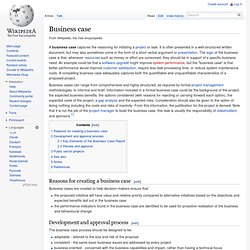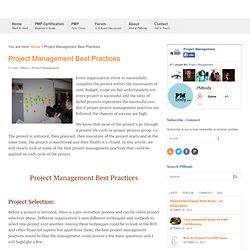

Business case. A business case captures the reasoning for initiating a project or task.

It is often presented in a well-structured written document, but may also sometimes come in the form of a short verbal argument or presentation. The logic of the business case is that, whenever resources such as money or effort are consumed, they should be in support of a specific business need. An example could be that a software upgrade might improve system performance, but the "business case" is that better performance would improve customer satisfaction, require less task processing time, or reduce system maintenance costs.
A compelling business case adequately captures both the quantifiable and unquantifiable characteristics of a proposed project. Reasons for creating a business case[edit] Business cases are created to help decision-makers ensure that: Development and approval process[edit] The business case process should be designed to be: Key Elements of the Business Case Report[edit] Review and approval[edit] Project Management best Practices. Every organization strive to successfully complete the project within the constraints of cost, budget, scope etc but unfortunately not every project is successful and the ratio of failed projects supersedes the successful one.

But if proper project management practices are followed the chances of success are high. We know that most of the project’s go through a project life cycle or project process group. i.e: The project is initiated, then planned, then execution of the project starts and at the same time, the project is monitored and then finally it’s closed. In this article, we will closely look at some of the best project management practices that could be applied on each cycle of the project. Project Selection: Before a project is initiated, there is a pre-initiation process and can be called project selection phase. Do this project in any way according to the company strategic goals? Initiation: Many people skip this process and move directly to planning. Do we have a Charter? Scope:
Oa.mo.gov/itsd/cio/projectmgmt/V4_1/MOBPM_Chapter02_V4_1.pdf. Feasibility Study – How to Write a Technical Feasibility Study for Small Businesses. Feasibility Study Course Index - List of All Lessons Navigate Lesson #3: Purpose of Lesson: In this lesson you will learn how to identify the materials, labor, transportation, shipping, physical location, technology, and other important logistics of how your business will run.

What is a Technical Feasibility Study? The Technical Feasibility Study assesses the details of how you will deliver a product or service (i.e., materials, labor, transportation, where your business will be located, technology needed, etc.). Think of the technical feasibility study as the logistical or tactical plan of how your business will produce, store, deliver, and track its products or services. A technical feasibility study is an excellent tool for trouble-shooting and long-term planning. The Technical Feasibility Study Must Support Your Financial Information You should also not strictly rely on feasibility study conclusions to impress an investor. Preparing an Outline for Writing Your Technical Feasibility Study.